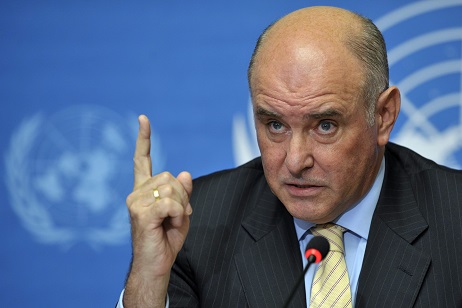Russian official: Moscow dislikes anti-Russian rhetoric in Tbilisi, Kremlin patience has limits

Georgia’s territorial integrity is the only principle which normalized relations between Georgia and Russia will be built on.
These words were spoken by Georgia’s Prime Minister Giorgi Kvirikashvili following harsh statements by Russia’s Deputy Foreign Minister Grigory Karasin, where he said Moscow disliked the "increasing anti-Russian rhetoric in Tbilisi” and the Kremlin’s patience "has limits too”.
Karasin and Zurab Abashidze, Georgian PM’s special envoy for relations with Russia, are in Prague for a meeting today.
Abashidze-Karasin meetings, held in the Czech Republic every now and then, is the only format of direct communication between Georgia and Russia since the two nations fought a brief war in August 2008.
At the doorsteps before today’s meeting Karasin told Georgian media Moscow strongly disliked the "increasing anti-Russian rhetoric” in Georgian politics.
"For now the main threats are the upcoming parliamentary elections in Georgia and the obvious increasing anti-Russian, provocative rhetoric, which is heard both in Tbilisi and in the international arena,” Karasin said.
"Most regretful is that such rhetoric is heard from officials too, including Ministers and even from the President.”
Karasin said Moscow tried not to react to such "pinches” from Georgian high officials but he added the Kremlin "made conclusions for itself”.
"Currently we’re standing at the watershed, where we should either go back to the period of confrontations or eventually normalise relations based on mutual respect,” Karasin said.
He added each politician in Georgia wanted to show they were patriotic and had a firm position against "so-called Russian expansion and threat”. In this context, Karasin particularly criticised Georgia’s Defence Minister Tinatin Khidasheli, who, as he put it, "even said the civilized world needs to unite against Russian threats”.
"In a normal society, as a rule, such statements are not forgiven. We still prefer to refrain ourselves but I fear our patience has limits too,” Karasin said.
The Russian politician’s statements were unwelcomed in Tbilisi.
When asked to comment on the statements, Prime Minister Kvirikashvili said he didn’t listen to the exact words by Karasin but he believed when speaking about the atmosphere in Georgia, Russian politicians first needed to pay attention to their own approaches.
"Georgia’s territorial integrity and sovereignty is what will make it possible for us to fully normalise relations with Russia,” Kvirikashvili said.
"We should do our best to reduce escalation and move to the level where flinging solutions to existing problems is possible, but this cannot happen at the expense of our foreign policy and territorial integrity; no compromise will be made here.”
Leader of the Georgian Dream Parliamentary fraction Gia Volski assessed Karasin’s statements as "aggressive” and an attempt to interfere in Georgia’s domestic affairs.
"Negotiating with Russia is important but it doesn’t change Georgia’s foreign policy,” Volski said.
He added it was the Georgian people who decided the country’s European course.
"It seems like Karasin has forgotten Russia is occupying Georgian territories,” he noted.
 Tweet
Tweet  Share
Share